Efficient Gills Allow For Sustained Life At High Temperature
(Harder Fighting Fish Possible)
Yellowstone To Introduce Modified Species
Is this important
=========================
.. The trout is a fish that requires cold water with high dissolved oxygen content. It is as much the lack of dissolved oxygen—not just the temperature - that is fatal to the trout in warm waters.
.. An interesting combination of research findings has led to the discovery of mechanisms that will allow trout to tolerate higher temperatures and lower oxygen in rivers, streams and lakes.
.. Research into topics as diverse as ice cream and global warming have produced findings about gill mutation and augmentation that suggest: "trout can be produced that will tolerate higher water temperatures & significantly lower oxygen content."
.. The first reported result of the research is a process by UNILEVER to produce low-fat ice cream from a fish-blood protein.
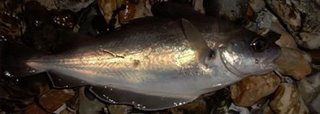
<- Pout Fish
.
.
.
.. The blood protein originally used in the research comes from the eel-like ocean pout fish, ( see SEA FISHING for details,) which uses it to survive extreme cold at the bottom of the seas.
..The process is used to make ice cream with less fat and fewer calories. In a June 23, 2006 DAILY MAIL article the researchers note that: “The protein has been chemically synthesized and can be grown in vast vats which produce a brownish liquid. This is added to the ice cream and lowers the temperature at which ice crystals form and the shape they take up.”
.. This Genetic Engineering, (GE,) was highlighted on June 26, 2006 by Alaska Fishermen in their web page Alaska Report. The process has already been approved for use in the United States.
.. GE Free Main, a website in Maine quotes Friends of the Earth food campaigner Clare Oxborrow who said: "At a time when more and more consumers want to choose unadulterated food, it's disappointing to see Unilever investing in this unnecessary development in overly processed food."

<- Amanita Gills
.. This research also found that the process could be used to modify tissue such as gills and blood to become less viscous and more gas permeable.
.. This result was shown in a series of photos at FishDoc.com in the exploration of bacterial, or environmental gill disease.
.. The pictures show how gill clumping in cold water fish leads to oxygen deprivation.
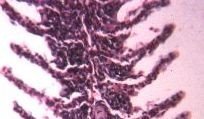
<- Normal Gill
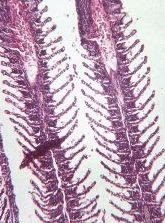
<- Gill Clumping
.. The Billings Gazette has just reported on similar research for the production of “Super Trout.” Their article cites research that suggests that if trout are fed creatine, (the same stuff Mark McGwire used,) we could develop super trout with stronger muscles and greater fighting stamina.
.. Alicia Amyx, part of a family that has operated the Rainbow Trout Ranch fee-fishing operation near Rockbridge, Mo., since 1954, agreed that a new genetically engineered trout could present new possibilities."Fee-fishing operations could market that they had harder-fighting fish, and they could gain some business. I'm sure it would be attractive to some of our fishermen, having harder-fighting trout." she said. "Trout 2 pounds and up fight hard enough. We hear a lot of stories about the one that got away. To have a trout that fought even harder could be exciting."
.. The United States Trout Farmers Association has already expressed interest in the fish for warm water farming in Georgia and Florida. Hopes are high that a tropical sea-run trout can also be developed.
.. J. L. Fernandez, et. al. in their article “AluI in situ digestion of human alphoid and classical satellite DNA regions: high-resolution digital image analysis of FISH signals from condensed and extended chromatin.” show the necessary steps for DNA implantation to bring the efficient gills to the trout.
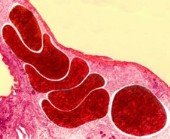
<- Cell stacking
.. As shown in the photos, the “clumping,” or “stacking” of trout blood cells reduces their efficiency in carrying dissolved oxygen from the gills to the rest of the organism. The proposed DNA implantation, and the more efficient gills disperse the blood cells and allow for a more efficient gaseous exchange through the more permeable gill membranes. This condition supposedly allows the trout to live in warmer, (less oxygen-rich,) environments.
.. Another potential use for the DNA modifications is in the treatment of the human condition known as "Rouleaux." Rouleaux is a medical term for a condition wherein the blood cells clump together forming what looks like stacks of coins.
.. This is an unhealthy state because the cells are not free to absorb and carry oxygen. It is a pre-cursor to many serious diseases, and is associated with ‘stress’ in mammals. "Should the calming effects in mammals be observed in trout it is likely that they will rise more freely and take more willingly."
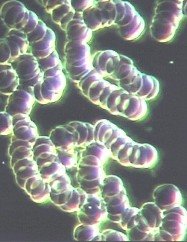
<- Severe Cell Stacking
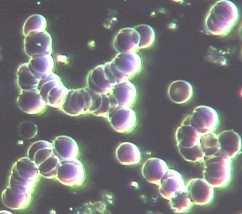
<- Moderate Cell Stacking

<- No Cell Stacking
.. A final result of the applied research comes from The Center for South East Asian Studies, Kyoto University, Kyoto, Japan. In a paper, Y. Yoshida has suggested that there are probably uses for the blood modification in the treatment of MYELODYSPLASTIC SYNROME.
.. Myelodysplastic syndrome (MDS) is a disease of the blood whose etiology is unclear. The ability to "un-clump" the blood is a major breakthrough!
=========================
.. The first trout to be genetically modified are probably going to be planted in sterile, warm water lakes in the Bechler Region of Yellowstone National Park & in several hot springs along the Firehole River in The Upper Geyser Basin around OLD FAITHFUL.
.. The probable scientific name of the new GE TROUT has been influenced by the California Golden Trout “Oncorhynchus aguabonita.” and has been informally dubbed "Oncorhynchus geyserensis", (The Geyser Trout.)
.. Since the brood stock for the genetically engineered experimental fish was the Yellowstone Cutthroat “Oncorhynchus clarki bouveri” it is presumed that the final taxonomic nomenenclature will be: “Oncorhynchus geyserensis yellowstonii,” in honor of the first experimental population in the wild. A revised partial species list for North American salmonid taxonomic data can be found HERE.
Really?????
